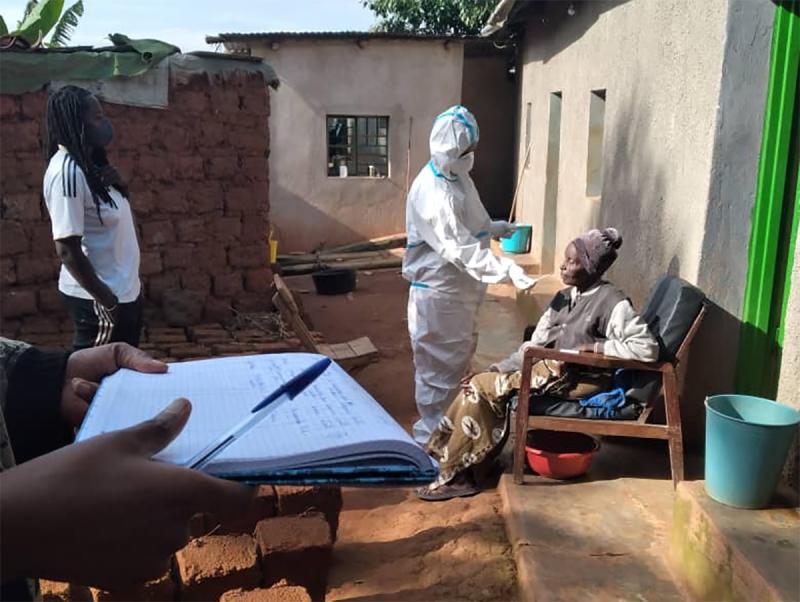Where We Work
See our interactive map


A member of the Gicumbi District COVID-19 command post collecting a COVID-19 sample during a mass testing event. Photo by Claudette Uwayisaba for IntraHealth International.
Here’s how health workers brought infections down.
Since the emergence of COVID-19, Rwanda has been one of the most efficient countries in the world in handling the pandemic. The government’s commitment to health services and well-coordinated efforts with various nonprofit, institutional, and private-sector partners have made Rwanda’s response a success.
But in late 2020, Rwanda experienced a second wave of COVID-19 infections. In January 2021, Gicumbi District registered 356 cases, one of the highest rates of infection in any district at the time.
After the surge in COVID-19 cases, district officials had to double their efforts to respond to the situation. They asked IntraHealth International’s United States Agency for International Development (USAID)-funded Ingobyi Activity, a health partner in the Gicumbi District, for technical and logistical support. The Ingobyi Activity supports Gicumbi and 19 other districts in Rwanda to increase equitable access to services for malaria and for reproductive, maternal, newborn, and child health. We do this by working with and training health workers from different levels in the district—from community district hospital.
When cases began to rise in the district, Claudette Uwayisaba, a specialist in adolescent sexual and reproductive health for the Ingobyi Activity, was assigned to work with Gicumbi District’s COVID-19 command post.“Together with the command post team, we helped the district to conduct mass-testing in designated locations,” Claudette says. “Whenever we identified a positive case, we would proceed with contact tracing. When the infected person presented mild or no symptoms, the client was placed in home-based care, mainly to ease the pressure that would be put on treatment centers.”
While providing these services, Claudette often felt stress coupled with fear. “Personally, it was very stressful,” she says. “People were losing their loved ones an others were very anxious after discovering that they had tested positive. And I was also part of the team that was in charge of handling burials.”
Claudette was constantly afraid of contracting COVID-19. She would go home and often refuse to go near anyone in her family, fearing that she might pass it to them. Fortunately, her training helped her cope with the stress. “I have experience with infection control and protection,” she says. “I used this experience to remain focused and the results we got from the intervention were so satisfying that it helped ease off the pressure and stress.”
Slowly the community began to see a decrease in cases.
The Ingobyi Activity also partnered with the COVID-19 command post to provide psychosocial support to community members as well.
“We supported people who were infected with COVID-19 to cope with the stress that comes with it,” Claudette says.
“We provided counseling support for individuals who lost their loved ones due to COVID-19.”Claudette and the other health workers at the command post conducted testing, contact tracing, and followed up clients enrolled in home-based care services. They also delivered samples to Rwanda’s national reference laboratory to be tested.
And slowly the community began to see a decrease in cases. So much so that Claudette was reassigned, and she stopped working in the Gicumbi District.
“The citizens were very welcoming—they saw us as a relief,” she says. “We were helping them contain a disease that was taking the lives of their loved ones and neighbors. We really got along well even after my assignment to the command post came to an end. I still received calls from the people asking me why I was no longer going to meet them.”
USAID Ingobyi Activity’s support to Gicumbi district to contain COVID-19 lasted about two months (January – March 2021). As a result, the Gicumbi District was able to contain the spread of the virus and reduced the number of active cases in the district. In February 2021, COVID-19 cases fell to 74.
The Ingobyi Activity is a consortium led by IntraHealth International in collaboration with the Rwanda Ministry of Health to reduce preventable infant and maternal deaths, reduce the incidence of malaria, and bring high-quality, integrated health services to more Rwandan mothers, children, and adolescents. It is funded by USAID.
Get stories from health workers around the world delivered right to your inbox: sign up for our mailing list.
Get the latest updates from the blog and eNews




